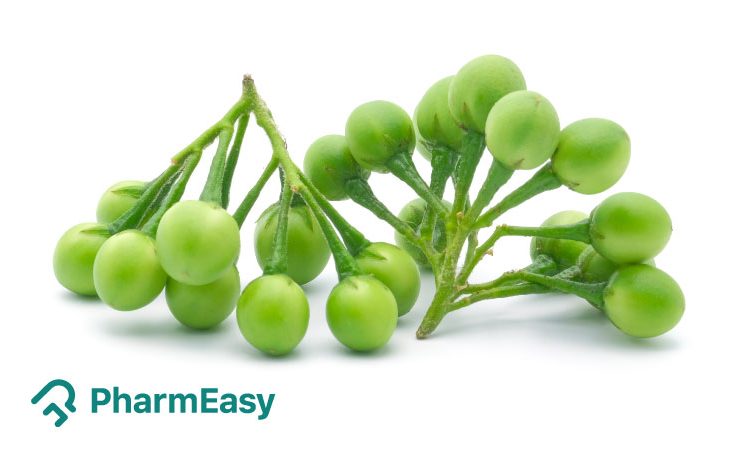Turkey Berry (Solanum Torvum): Uses, Benefits and Side Effects by Dr. Rajeev Singh
By Dr Rajeev Singh +2 more

Get,

to manage your symptom
Get your,


4 Cr+ families
benefitted

OTP sent to 9988776655



You’ve successfully subscribed to receive
doctor-approved tips on
Whatsapp

Get ready to feel your best.

Hi There,
Download the PharmEasy App now!!


Register to Avail the Offer
Send OTPBy continuing, you agree with our Privacy Policy and Terms and Conditions

Hi There,
Sign up on PharmEasy now!!
Trusted by 4 crore+ families

OTP sent to 9988776655



You have unlocked 25% off on medicines




Code: NU25

Comments


Leave your comment here
By Dr Rajeev Singh +2 more
Table of Contents
There’s an old saying, “the jasmine grown in your backyard will not smell as good as the one you buy from the market”. This is how I felt while researching Turkey berries. Turkey berries are found on a spiny, flowering shrub that produces clusters of pea-sized, yellow-green berries. Turkey berry is commonly known as Brihati marathi marang in Sanskrit, Bhankatiya and bhurat in Hindi and chunndakkai and Sundakkai in Tamil. Further, they are also called pokak, pea eggplant and devil’s fig. The scientific name of the turkey berry is Solanum torvum and it belongs to the family Solanaceae. It is a wild relative of eggplant and is commonly found in Asia, tropical Africa and South America1. There are many health benefits of turkey berries; let us know more about these in this article.
Turkey’s berry is highly nutritious due to their various nutritional components. They are a good source of proteins, carbohydrates, fats and minerals like potassium, sodium, iron, magnesium and copper. The phytochemicals in turkey berries include phenols, alkaloids, antioxidants, sterols and triterpenes3.

Below is the Nutritional components of Turkey berry3
As a haemostatic, the leaves of turkey berry are used. According to phytochemical investigations, this species’ fruits contain significant amounts of different alkaloids, flavonoids, saponins, tannins, and glycosides to have pharmacological effects. In my experience, fruit decoctions may therefore not only be used for nutritional grounds but also cough problems and are thought to be an excellent treatment for liver and spleen enlargement. The mature fruits may be used to make tonics and haemopoietic medicines as well as pain relievers10.
Dr. Siddharth Gupta, B.A.M.S, M.D (Ayu)
Turkey berries may have numerous properties and some of them are mentioned below:
Turkey berries may have different potential uses and some of the health benefits of Turkey berry is:

Literature studies have found many natural substances that may help reduce pain and inflammation; one such discovery is turkey berries. A study4 by Ndebia et al. in 2006 stated that turkey berry consumption helped reduce inflammation and pain. This effect is attributed due to the inhibition of prostaglandins (natural substances which can cause chronic pain and inflammation). This indicates that turkey berry has the potential to manage pain and inflammation and may be used to treat conditions like arthritis. However, to support these claims, more studies are needed. Additionally, it is advised to consult a doctor for proper treatment of pain and inflammation and not rely on turkey seeds alone.

The immune system helps in protecting the body against viruses, bacteria and fungi. George et al. conducted a review5 in 2011 which stated that consumption of turkey berries might increase white blood cells and neutrophils. Neutrophils effectively defend against pus-forming bacteria and are the first to fight against infection. Turkey berries also contain Vitamin C, which helps convert iron into a more readily absorbable form. This indicates that turkey berries may enhance immunity and help fight against infections. However, we need more studies to confirm these effects. Additionally, it is advised to consult your doctor for the proper treatment of diseases and not consider turkey berries as an alternative to modern medicine.

Fruits and vegetables are packed with bioactive compounds, which may help manage blood glucose levels. These bioactive compounds may help in controlling blood glucose levels. Gandhi et al. 2011 conducted a study6 that showed that turkey berries might help reduce blood glucose levels in diabetic rats. This might be due to the phenols. These phenols act as antioxidants and may lead to insulin sensitivity and secretion. This indicates that turkey berry has the potential to lower blood glucose and thus may help in managing diabetes. However, to claim these results in humans, more studies are needed. If you have any complaints of diabetes, it is advised to consult your doctor and avoid self-medication.

Cancer is a dangerous and fast-spreading disease with uncontrolled multiplication of cells. The abnormal cells divide rapidly and affect the other cells and organs. Balachandran et al. 2015 conducted a study7 on turkey berries and explained that turkey berries may inhibit the multiplication of cells and may reduce the progression of cancer. The methyl caffeate in the turkey berries may hinder the cancer cells and induce apoptosis. However, further studies are required to check the valuable properties of turkey berries on Humans. If you have any cancer symptoms or signs, consult your doctor and do not self-medicate.
I recently read an article that suggests vitamins C and E found in Turkey Berry may have nephroprotective properties because they have antioxidant properties that are believed to shield molecules from oxidation11.
Dr. Rajeev Singh, BAMS

High blood pressure may lead to conditions like stroke and cardiac diseases. Mohan et al. 2009 conducted a study8 in rats to assess the effect of turkey berries on blood pressure. The results of this study showed that turkey berries have the potential to reduce blood pressure by relaxing the blood vessels. This indicates that turkey berries may positively impact blood pressure. However, we need more studies to claim these results in humans. Further, it is advised to consult your doctor for proper management of any blood pressure abnormality. Kindly do not consider turkey berries as a substitute for modern medicine.

Though studies show the benefits of Turkey berries in different conditions, these are insufficient, still, more studies are needed to establish the true extent of the use of Turkey berries on human health.
Studies11 suggest cardiovascular illnesses are less common in those who consume a diet high in fruits and vegetables and their associated phytochemicals. Numerous studies show a link between higher dietary consumption of natural phenolic antioxidants and a decreased risk of coronary heart disease. In my experience, fruit extracts from Turkey Berry have anti-oxidant qualities that may be linked to their cardio-protective effects and the prevention of heart-related disorders such as hypertension, stroke, and coronary problems.
Dr. Smita Barode, B.A.M.S, M.S.
This fruit can be used in the following ways:
You must consult the doctor before taking any higher quantities of herbal supplements or turkey berries. Only discontinue or replace an ongoing treatment with an ayurvedic/herbal preparation by consulting a qualified doctor.
Following are the side effects related to the consumption of Turkey berries:
However, if you experience any reactions to turkey berries, it is advised to stop the intake and contact a doctor or your Ayurvedic physician for proper guidance.
Eating Turkey berries in moderate amounts is okay. However, general precautions must be followed:
There are limited studies on the interactions of turkey berries with other medicines or food. However, the following are some potential interactions of turkey berries that are not proven, but they may likely happen:
You must always seek the advice of your Ayurvedic doctor about the possible interaction of turkey berries with other drugs5,6.
Also Read: Raspberries: Uses, Benefits, Side Effects By Dr. Rajeev Singh
The scientific name of the turkey berry is Solanum turvum, which belongs to the family Solanaceae1.
In Hindi, turkey berry is called Bhankatiya and bhurat1.
Turkey berries can be consumed raw directly. Sometimes, the juice is extracted from the raw berries and consumed. Turkey berries are also cooked and consumed3.
It is advised to wash turkey berries thoroughly under tap water; this will help in removing germs and any soil-borne microbes. Additionally, there is limited data on the safety of turkey berries in particular groups like children, pregnant and lactating women and the elderly. It is necessary to take caution if you belong to this group and are planning to add turkey berries to your dietary regimen.
Consumption of turkey berries in excess can cause gastrointestinal disorders like constipation.
Disclaimer: The information provided here is for educational/awareness purposes only and is not intended to be a substitute for medical treatment by a healthcare professional and should not be relied upon to diagnose or treat any medical condition. The reader should consult a registered medical practitioner to determine the appropriateness of the information and before consuming any medication. PharmEasy does not provide any guarantee or warranty (express or implied) regarding the accuracy, adequacy, completeness, legality, reliability or usefulness of the information; and disclaims any liability arising thereof.
Links and product recommendations in the information provided here are advertisements of third-party products available on the website. PharmEasy does not make any representation on the accuracy or suitability of such products/services. Advertisements do not influence the editorial decisions or content. The information in this blog is subject to change without notice. The authors and administrators reserve the right to modify, add, or remove content without notification. It is your responsibility to review this disclaimer regularly for any changes.
Comments

Leave your comment...

View all comments(1)
You may also like
How to use this turkey berry